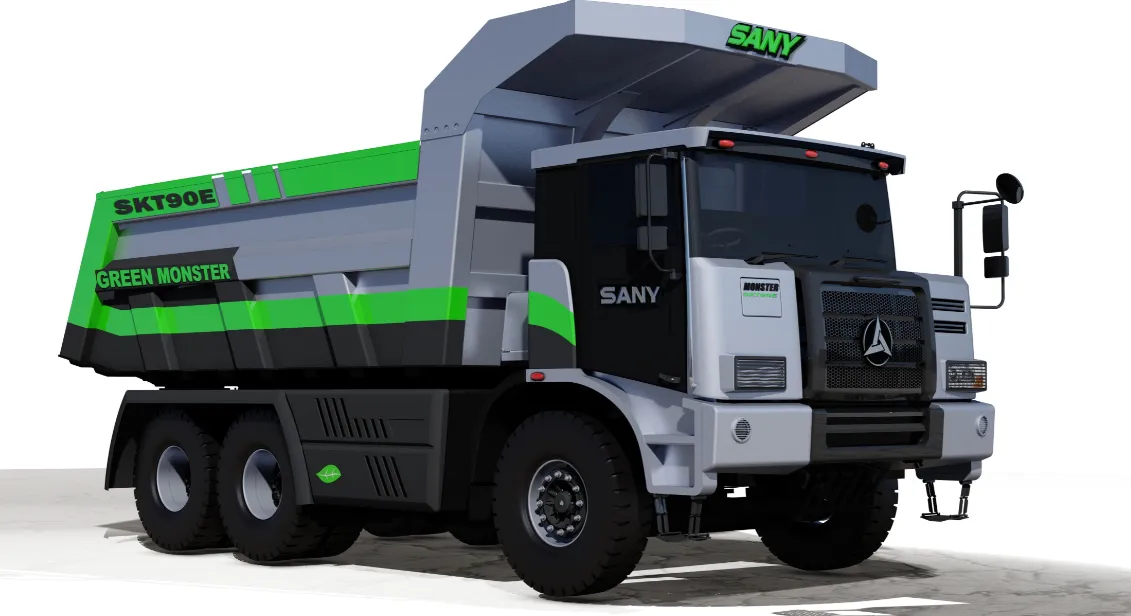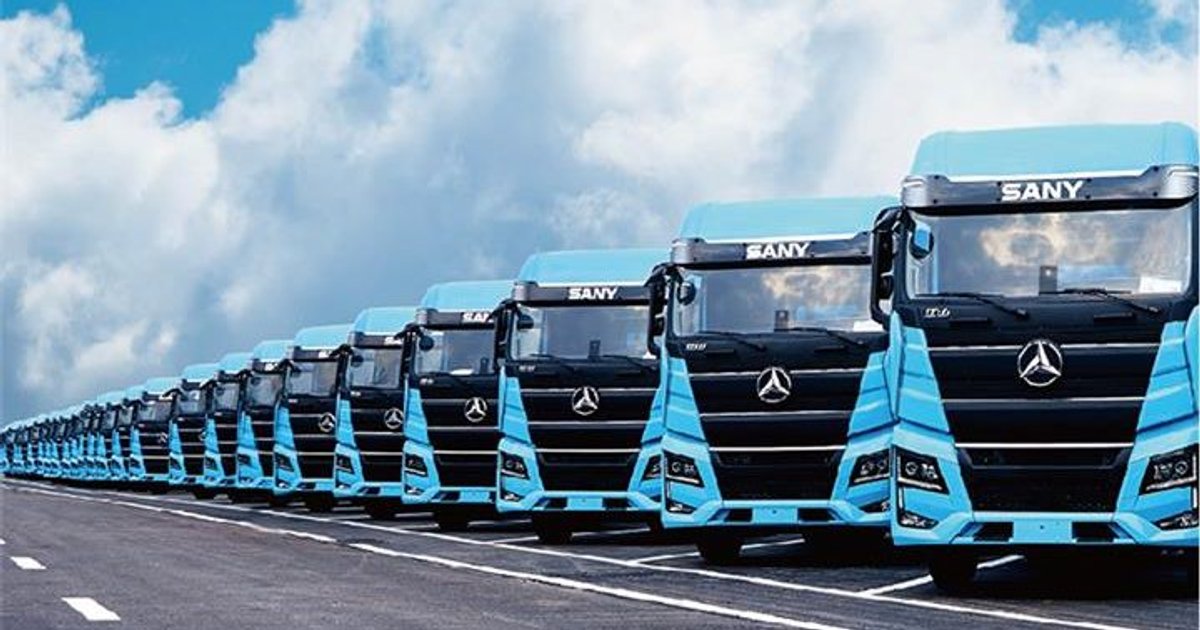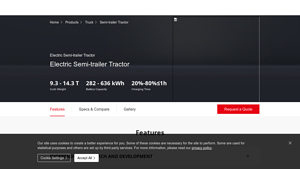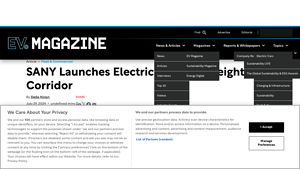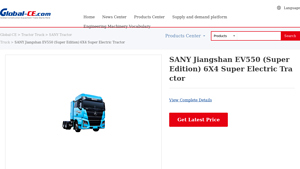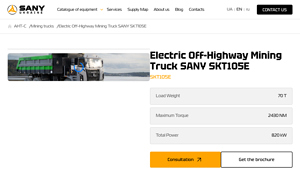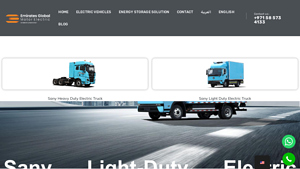Introduction: Navigating the Global Market for electric truck sany
In today’s rapidly evolving logistics landscape, sourcing electric trucks, particularly from SANY, presents both an opportunity and a challenge for international B2B buyers. As businesses pivot toward sustainable practices, the demand for electric vehicles is surging, yet many companies grapple with understanding the diverse offerings and applications available in the market. This guide aims to provide an in-depth exploration of electric trucks from SANY, covering various models, their applications across industries, supplier vetting processes, and cost considerations.
By addressing key aspects such as battery capacities, charging infrastructure, and operational efficiencies, this guide empowers decision-makers from regions such as Africa, South America, the Middle East, and Europe—including countries like Nigeria and Germany—to make informed purchasing decisions. Our comprehensive analysis not only highlights the advantages of adopting electric trucks for eco-friendly logistics but also emphasizes SANY’s commitment to innovation and reliability.
Ultimately, this resource serves as a strategic tool for businesses seeking to enhance their transportation capabilities while reducing their carbon footprint. With actionable insights, buyers will be better equipped to navigate the complexities of the global market for electric trucks, ensuring they select solutions that align with their operational needs and sustainability goals.
Understanding electric truck sany Types and Variations
| Type Name | Key Distinguishing Features | Primary B2B Applications | Brief Pros & Cons for Buyers |
|---|---|---|---|
| Electric Semi-trailer Tractor | High torque, large battery capacity (282-636 kWh), fast charging | Long-haul freight, heavy-duty transport | Pros: Long range, efficient, eco-friendly Cons: Higher initial investment, charging infrastructure needed |
| Electric Light Truck | Compact design, lighter weight (up to 6,000 kg), max speed 90 km/h | Urban delivery, short-distance logistics | Pros: Maneuverable, cost-effective for local deliveries Cons: Limited range compared to heavy trucks |
| Electric Flat Top Truck | Rechargeable, designed for flatbed applications, robust support | Construction, material transport | Pros: Versatile, supports diverse loads Cons: May require specialized training for operators |
| Electric Heavy Duty Truck | High reliability, minimal maintenance, dual-source oil pump | Mining, heavy-duty logistics | Pros: High uptime, low failure rate Cons: Requires significant investment in charging infrastructure |
| Electric Freight Corridor Truck | Operates along electrified routes, integrated with charging stations | Long-distance freight on dedicated routes | Pros: Sustainable, optimized for efficiency Cons: Limited to specific routes, initial setup cost |
What are the Characteristics of the Electric Semi-trailer Tractor?
The Electric Semi-trailer Tractor is designed for heavy-duty applications, boasting a battery capacity that ranges from 282 to 636 kWh. With fast charging capabilities allowing for 20%-80% in under an hour, it is ideal for long-haul freight operations. Its high torque output enables efficient transport of heavy loads, making it suitable for logistics companies looking to reduce operational costs through electrification. Buyers should consider the infrastructure needed for charging and the higher upfront costs compared to traditional diesel trucks.
How Does the Electric Light Truck Serve Urban Logistics?
The Electric Light Truck is tailored for urban environments, featuring a compact design and a maximum weight capacity of 6,000 kg. With a speed of up to 90 km/h, it is perfect for short-distance deliveries and local logistics. Its lighter weight contributes to lower energy consumption, making it a cost-effective option for businesses focused on eco-friendly practices. However, its limited range compared to heavier trucks may require strategic planning for routes and deliveries.
What Makes the Electric Flat Top Truck Versatile?
The Electric Flat Top Truck is engineered for versatility, suitable for transporting various types of materials in construction and logistics. Its rechargeable capabilities and robust support infrastructure make it an attractive option for companies needing flexible transport solutions. While it can handle diverse loads, buyers should assess whether their operators require specialized training to maximize efficiency and safety during operations.
Why Choose the Electric Heavy Duty Truck for Mining?
The Electric Heavy Duty Truck is built for reliability, featuring a dual-source oil pump that ensures safe operations even in emergencies. Its design minimizes maintenance needs, making it a solid choice for industries such as mining, where uptime is crucial. While the initial investment may be significant, the long-term savings in maintenance and fuel costs can be substantial, making it an appealing option for B2B buyers focused on sustainability and operational efficiency.
How Does the Electric Freight Corridor Truck Enhance Logistics?
Designed to operate along dedicated electrified routes, the Electric Freight Corridor Truck supports long-distance freight operations with minimal environmental impact. This model is integrated with a network of charging stations, allowing for efficient and sustainable logistics solutions. However, it is essential for buyers to consider the limitations of operating exclusively on these routes and the initial setup costs associated with establishing the necessary infrastructure.
Key Industrial Applications of electric truck sany
| Industry/Sector | Specific Application of electric truck sany | Value/Benefit for the Business | Key Sourcing Considerations for this Application |
|---|---|---|---|
| Logistics & Freight | Long-haul freight transportation along electrified corridors | Reduced operational costs and lower carbon footprint | Availability of charging infrastructure, maintenance support, range |
| Construction | Transporting heavy materials on construction sites | Enhanced efficiency and reduced emissions | Load capacity, charging time, terrain adaptability |
| Mining | Hauling materials in mining operations | Increased uptime and lower maintenance costs | Durability, battery life, and ability to operate in rugged conditions |
| Agriculture | Delivering agricultural produce to markets | Minimization of transportation costs and environmental impact | Payload capacity, reliability, and availability of service stations |
| Urban Delivery | Last-mile delivery in urban areas | Improved delivery efficiency and reduced urban congestion | Size and maneuverability, charging options, and fleet management tools |
How Can Electric Truck SANY Benefit the Logistics and Freight Industry?
Electric trucks from SANY are transforming the logistics and freight industry, particularly through their deployment along electrified corridors. These trucks significantly reduce operational costs due to lower energy consumption and maintenance needs, while also minimizing the carbon footprint, making them ideal for businesses focused on sustainability. For international buyers, especially from regions like Africa and South America, it’s crucial to consider the availability of charging infrastructure and service support to ensure seamless operations.
What Role Do Electric Trucks Play in Construction?
In the construction sector, SANY’s electric trucks are utilized for transporting heavy materials, ensuring projects are completed efficiently and sustainably. Their ability to operate with lower emissions addresses environmental regulations while enhancing productivity. Buyers in Europe, particularly Germany, should assess the trucks’ load capacities and charging times to align with project timelines and site conditions, ensuring minimal downtime.
How Are Electric Trucks Used in Mining Operations?
Electric trucks are increasingly used in mining to haul materials, offering businesses a solution with high uptime and lower maintenance costs. Their robust design and advanced battery technology allow them to operate in challenging environments while reducing the reliance on fossil fuels. For B2B buyers in the Middle East, where mining is prevalent, understanding the durability and battery life of these trucks is essential for making informed purchasing decisions.
In What Ways Can Electric Trucks Support Agriculture?
In agriculture, SANY electric trucks facilitate the efficient delivery of produce to markets, helping farmers reduce transportation costs and environmental impact. Their design allows for easy maneuverability in rural settings, which is particularly beneficial in regions like Africa where road conditions may vary. Buyers should prioritize payload capacity and reliability, as these factors significantly influence operational success in agricultural logistics.
How Do Electric Trucks Enhance Urban Delivery Services?
Electric trucks are ideal for last-mile delivery in urban areas, where they help improve efficiency and reduce congestion. Their compact size and low emissions make them suitable for navigating city streets while adhering to environmental regulations. International buyers focusing on urban logistics should evaluate the trucks’ maneuverability and available charging options, ensuring they can effectively manage fleet operations in densely populated areas.
3 Common User Pain Points for ‘electric truck sany’ & Their Solutions
Scenario 1: Navigating Charging Infrastructure Challenges
The Problem: B2B buyers often face significant hurdles in establishing reliable charging infrastructure for electric trucks, particularly in regions with limited access to electric vehicle (EV) support systems. For companies operating in remote or underdeveloped areas, the absence of fast charging stations can lead to operational delays and reduced fleet efficiency. This becomes even more critical for logistics companies that depend on timely deliveries to maintain customer satisfaction and competitiveness in the market.
The Solution: To effectively address this challenge, businesses should conduct a comprehensive assessment of potential charging locations before acquiring electric trucks from SANY. Collaborating with local energy providers to identify suitable charging infrastructure can facilitate the development of dedicated charging stations. Additionally, SANY’s electric trucks offer fast charging capabilities, enabling a 20%-80% charge in as little as 40 minutes. B2B buyers should leverage this feature by strategically planning routes that incorporate charging stops, ensuring minimal downtime. Furthermore, investing in a battery swapping program can significantly reduce wait times, as SANY’s battery swapping technology allows for quick exchanges in under five minutes, enhancing operational efficiency.
Scenario 2: Addressing Range Anxiety in Long-Haul Operations
The Problem: A prevalent concern among B2B buyers is the “range anxiety” associated with electric trucks, especially for long-haul operations. Companies fear that electric trucks may not cover the required distances, leading to potential disruptions in logistics. This anxiety is compounded in regions where charging stations may be scarce, making it difficult to plan routes effectively without risking service interruptions.
The Solution: To mitigate range anxiety, buyers should thoroughly evaluate the specifications of SANY’s electric trucks, which offer impressive battery capacities ranging from 282 kWh to 636 kWh. By utilizing the energy-efficient design, which achieves energy consumption of less than 135 kWh per 100 kilometers, fleets can maximize their operational range. B2B buyers should consider integrating advanced telematics and route optimization software to analyze driving patterns and adjust routes based on real-time data. This approach enables logistics managers to create efficient delivery schedules that capitalize on the electric truck’s capabilities. Additionally, forming partnerships with regional logistics hubs to establish charging stations along frequently traveled routes can provide peace of mind and ensure uninterrupted operations.
Scenario 3: Ensuring Maintenance and Repair Support
The Problem: Buyers may express concerns about the long-term maintenance and repair of electric trucks, particularly in regions where access to specialized service providers is limited. Without proper support, companies risk incurring high downtime costs and operational inefficiencies, which can impact their bottom line and service delivery.
The Solution: To overcome these challenges, it is essential for B2B buyers to engage with SANY regarding their extensive service network and warranty options. SANY offers a comprehensive after-sales support system, which includes training for local mechanics on electric truck maintenance and access to spare parts, ensuring that service can be performed quickly and efficiently. Buyers should also consider investing in a service contract that covers routine maintenance and emergency repairs, thus ensuring that their fleet remains operational without unexpected costs. Establishing a local service partnership can further enhance support and reduce downtime, enabling a proactive approach to maintenance. Additionally, utilizing SANY’s cloud-based diagnostics can help in identifying potential issues early, allowing for preventive measures to be taken before they escalate into costly repairs. By prioritizing maintenance planning and leveraging SANY’s support infrastructure, businesses can sustain their electric truck operations effectively.
Strategic Material Selection Guide for electric truck sany
What Materials Are Commonly Used in Electric Trucks and Their Implications?
When selecting materials for electric trucks, particularly the SANY electric truck models, several factors must be considered, including performance, durability, cost, and compliance with international standards. Below, we analyze four common materials used in the construction of electric trucks, focusing on their properties, advantages, disadvantages, and implications for international B2B buyers.
Aluminum: A Lightweight Champion
Aluminum is widely used in electric truck manufacturing due to its excellent strength-to-weight ratio and corrosion resistance. It typically has a temperature rating up to 600°F (316°C) and offers good performance under varying pressure conditions.
Pros: Aluminum is lightweight, which contributes to better energy efficiency and range for electric vehicles. It also resists corrosion, reducing maintenance costs over time.
Cons: The manufacturing process for aluminum can be complex and costly, particularly for high-strength alloys. Additionally, while it is durable, it may not withstand impacts as well as steel.
Impact on Application: Aluminum is ideal for structural components and body panels, enhancing the overall efficiency of the electric truck.
Considerations for International Buyers: Compliance with standards such as ASTM and EN is crucial. Buyers should also consider local recycling capabilities, as aluminum is highly recyclable, aligning with sustainability goals in regions like Europe and South America.
Steel: The Traditional Workhorse
Steel remains a fundamental material in the automotive industry, known for its high tensile strength and durability. It can withstand extreme temperatures and pressures, making it suitable for various truck applications.
Pros: Steel is cost-effective and offers superior strength and impact resistance. It is readily available and can be easily formed into complex shapes.
Cons: Steel is heavier than aluminum, which can negatively affect the energy efficiency of electric trucks. It is also susceptible to corrosion unless treated.
Impact on Application: Steel is often used in the frame and chassis of electric trucks, providing stability and safety.
Considerations for International Buyers: Buyers in regions like Africa and the Middle East should ensure compliance with local standards such as JIS and ASTM. Corrosion resistance treatments may be necessary in humid or coastal environments.
Composite Materials: The Future of Lightweight Design
Composite materials, particularly carbon fiber and fiberglass, are increasingly being utilized in electric truck design due to their lightweight and high-strength properties. They can withstand a range of temperatures and pressures, depending on the specific formulation.
Pros: Composites offer excellent weight savings and can be tailored for specific applications, enhancing performance. They also provide good thermal insulation.
Cons: The primary drawback is the high cost of materials and manufacturing processes. Additionally, repairability can be an issue, as composites may require specialized techniques.
Impact on Application: Composites are ideal for non-structural components such as body panels and interior fittings, contributing to overall weight reduction.
Considerations for International Buyers: Buyers should be aware of the varying regulations regarding composite materials in different regions. Compliance with standards such as ASTM D3039 for tensile properties is essential.
Rubber: Essential for Mobility and Safety
Rubber is primarily used for tires and various seals in electric trucks. It performs well under a range of temperatures and provides excellent traction and flexibility.
Pros: Rubber is durable and provides good shock absorption, enhancing ride quality. It is also relatively inexpensive compared to other materials.
Cons: Rubber can degrade over time due to environmental exposure, necessitating regular maintenance and replacement.
Impact on Application: Rubber is critical for tire performance and sealing components, ensuring safety and efficiency.
Considerations for International Buyers: Compliance with tire safety standards such as ECE R30 is vital, particularly in regions with stringent vehicle regulations like Germany.
Summary Table of Material Selection for Electric Truck SANY
| Material | Typical Use Case for electric truck sany | Key Advantage | Key Disadvantage/Limitation | Relative Cost (Low/Med/High) |
|---|---|---|---|---|
| Aluminum | Body panels, structural components | Lightweight, corrosion-resistant | Higher manufacturing costs | Medium |
| Steel | Frame, chassis | High strength, cost-effective | Heavier, susceptible to corrosion | Low |
| Composite Materials | Body panels, interior fittings | Excellent weight savings, customizable | High cost, complex repairs | High |
| Rubber | Tires, seals | Durable, good shock absorption | Degrades over time | Low |
This guide provides a comprehensive overview of material selection for electric trucks, enabling international B2B buyers to make informed decisions that align with their operational needs and regulatory requirements.
In-depth Look: Manufacturing Processes and Quality Assurance for electric truck sany
What Are the Key Stages in the Manufacturing Process of SANY Electric Trucks?
The manufacturing process for SANY electric trucks is characterized by precision and innovation, ensuring that each vehicle meets the highest standards of performance and reliability. The process can be broken down into four main stages: material preparation, forming, assembly, and finishing.
-
Material Preparation: This initial stage involves sourcing high-quality materials that comply with international standards. SANY emphasizes the use of lightweight yet durable materials to enhance energy efficiency. The materials undergo rigorous inspections to ensure they meet specifications before proceeding to the next stage.
-
Forming: Advanced techniques such as stamping, welding, and machining are employed to shape the components of the electric truck. SANY utilizes automated machinery for precision in forming parts, ensuring that tolerances are consistently maintained. This reduces material waste and enhances the structural integrity of the truck.
-
Assembly: The assembly process is where individual components come together to form the complete vehicle. SANY employs a modular assembly line, allowing for flexibility and efficiency. Each vehicle undergoes a systematic assembly procedure, with specialized teams responsible for integrating electrical systems, battery packs, and mechanical components. This stage includes critical checks to confirm that all systems are functioning properly.
-
Finishing: The final stage involves surface treatment, painting, and installation of interior components. This not only enhances the aesthetic appeal of the trucks but also adds protective coatings to resist environmental factors. Quality checks are conducted at this stage to ensure that the finished product meets SANY’s high standards before it is dispatched.
How Does SANY Ensure Quality Control Throughout the Manufacturing Process?
Quality assurance is paramount at SANY, and the company adheres to several international and industry-specific standards. Key aspects of their quality control process include compliance with ISO 9001 and CE certification, which ensure that their products meet global quality and safety benchmarks.
What Are the Key Quality Control Checkpoints in the Manufacturing Process?
SANY implements a comprehensive quality control framework that encompasses three critical checkpoints:
-
Incoming Quality Control (IQC): This phase involves inspecting raw materials and components upon arrival at the manufacturing facility. Suppliers are required to provide certificates of compliance, and SANY conducts random sampling to verify material quality.
-
In-Process Quality Control (IPQC): Throughout the manufacturing process, SANY employs real-time monitoring and inspection. Trained quality assurance teams conduct checks at various stages, ensuring that the assembly and forming processes adhere to predefined specifications. Any discrepancies are addressed immediately to prevent defects.
-
Final Quality Control (FQC): Once the electric trucks are fully assembled, they undergo rigorous testing. This includes functional tests of the electrical systems, battery performance evaluations, and road tests to assess handling and efficiency. SANY aims for zero defects, and any vehicle not meeting standards is reworked or discarded.
What Testing Methods Are Commonly Used in Quality Assurance?
SANY utilizes a variety of testing methods to ensure the reliability and safety of their electric trucks:
- Functional Testing: Verifying that all systems, including brakes, steering, and electrical components, operate correctly under various conditions.
- Durability Testing: Simulating real-world conditions to evaluate the truck’s performance over extended periods.
- Environmental Testing: Assessing how trucks perform under extreme temperatures and weather conditions to ensure reliability in diverse environments.
How Can B2B Buyers Verify the Quality Control Processes of SANY?
For international B2B buyers, particularly those from Africa, South America, the Middle East, and Europe, verifying the quality control processes of suppliers like SANY is crucial. Here are several strategies to ensure confidence in the supplier’s QC measures:
-
Conduct Audits: Buyers can request to conduct on-site audits of the manufacturing facility. This allows them to observe the production process and quality control measures firsthand.
-
Review Quality Reports: SANY can provide detailed quality reports that outline their QC processes, testing results, and compliance with international standards. These documents should also include any third-party certifications.
-
Third-Party Inspections: Engaging independent inspection agencies to evaluate the manufacturing processes and finished products can provide an unbiased assessment of quality.
What Are the Unique Quality Control Considerations for International Buyers?
International buyers must navigate specific nuances when assessing quality control in the context of their regions. For instance:
-
Compliance with Local Regulations: Buyers in regions like Nigeria or Germany must ensure that the electric trucks comply with local safety and environmental regulations. SANY’s adherence to CE certification facilitates this process for European buyers.
-
Supply Chain Transparency: Given the complexities of global supply chains, buyers should inquire about the sourcing of materials and the traceability of components. This is particularly important in regions where material quality may vary.
-
After-Sales Support: Quality assurance does not end with the sale. Buyers should assess SANY’s after-sales support, including warranty terms and availability of spare parts, to ensure long-term operational efficiency.
Conclusion
Understanding the manufacturing processes and quality assurance practices employed by SANY is essential for B2B buyers looking to invest in electric trucks. By comprehending the stages of production, quality control checkpoints, and testing methods, buyers can make informed decisions and establish partnerships with confidence. Furthermore, verifying QC through audits and quality reports will enhance trust and ensure that the products meet their operational needs in diverse markets.
Practical Sourcing Guide: A Step-by-Step Checklist for ‘electric truck sany’
In the rapidly evolving landscape of electric transportation, sourcing electric trucks from reputable manufacturers like SANY requires careful planning and strategic execution. This guide serves as a comprehensive checklist for B2B buyers aiming to procure electric trucks, ensuring a streamlined and informed purchasing process.
Step 1: Define Your Technical Specifications
Establish clear technical requirements based on your operational needs. Consider factors such as load capacity, battery life, charging time, and range. For instance, SANY’s electric semi-trailer tractors come with battery capacities ranging from 282 kWh to 636 kWh, which can impact your logistics and operational efficiency.
- Key Considerations:
- Maximum load capacity and curb weight.
- Energy consumption metrics (e.g., kWh per 100 kilometers).
- Required charging infrastructure and time.
Step 2: Assess Your Budget and Financing Options
Determine your budget, including upfront costs and long-term operational expenses. Electric trucks may have higher initial costs but often lead to significant savings in fuel and maintenance over time. Explore financing options, leasing, or government incentives available in your region to make the investment more manageable.
- Financial Aspects:
- Total cost of ownership, including maintenance.
- Availability of grants or subsidies for electric vehicles.
- Financing plans offered by suppliers.
Step 3: Evaluate Potential Suppliers
Conduct thorough research on potential suppliers like SANY. Look for their track record in the electric truck market, focusing on reliability, customer service, and after-sales support. Request case studies or testimonials from other businesses in your industry to gauge their experience.
- Supplier Evaluation Criteria:
- Years of experience in electric vehicle manufacturing.
- Customer feedback and satisfaction ratings.
- Availability of spare parts and service centers.
Step 4: Verify Compliance with Local Regulations
Ensure that the electric trucks comply with local regulations and standards for emissions and safety. Different regions may have specific requirements regarding electric vehicle specifications, charging infrastructure, and operational guidelines.
- Regulatory Checks:
- Emission standards and certifications.
- Safety regulations related to electric vehicles.
- Local incentives for green transportation.
Step 5: Request Product Demonstrations
Before finalizing your purchase, request product demonstrations or trials. This allows you to assess the truck’s performance, handling, and features firsthand. Pay attention to the ease of operation, charging capabilities, and how well the vehicle meets your specific needs.
- Demonstration Focus:
- Performance under load.
- Charging speed and efficiency.
- User interface and driver comfort.
Step 6: Negotiate Terms and Conditions
Once you’ve identified a suitable supplier and product, negotiate the terms of sale. This includes warranty conditions, maintenance packages, and delivery timelines. Clear agreements on these aspects can prevent potential issues in the future.
- Negotiation Points:
- Warranty coverage and duration.
- Maintenance support and service agreements.
- Delivery schedules and logistical support.
Step 7: Plan for Infrastructure and Training
Finally, develop a plan for integrating the electric truck into your existing operations. This includes ensuring the availability of charging stations and training your staff on the new technology. Proper infrastructure and training will enhance operational efficiency and maximize the benefits of your new electric trucks.
- Integration Steps:
- Assess and install necessary charging infrastructure.
- Provide training for drivers and maintenance personnel.
- Monitor performance and collect data for optimization.
By following these steps, B2B buyers can effectively navigate the procurement process for electric trucks from SANY, ensuring they make informed decisions that align with their operational goals and sustainability objectives.
Comprehensive Cost and Pricing Analysis for electric truck sany Sourcing
What Are the Key Cost Components for Sourcing Electric Trucks from SANY?
When considering the procurement of electric trucks from SANY, international B2B buyers should be aware of several key cost components that contribute to the overall price. These include materials, labor, manufacturing overhead, tooling, quality control (QC), logistics, and margin.
-
Materials: The primary cost driver in electric truck manufacturing is the raw materials, including high-density batteries, lightweight composites, and electronic components. As battery technology advances, fluctuations in raw material prices, particularly lithium and cobalt, can significantly impact costs.
-
Labor: Skilled labor is essential for the assembly of electric trucks, particularly due to the complexity of electric systems and software integration. Labor costs may vary based on the region of production and the skill level required.
-
Manufacturing Overhead: This encompasses the costs associated with the facilities, utilities, and indirect labor that support production. Efficient manufacturing practices can help mitigate overhead costs.
-
Tooling: Initial investments in tooling for electric trucks can be substantial, especially if customization is required. Buyers should consider how these costs are amortized over production volume.
-
Quality Control (QC): Stringent quality assurance processes are critical for electric trucks, given the safety and performance implications. This can add to the overall cost but is necessary to ensure reliability and compliance with regulations.
-
Logistics: Shipping costs, including international freight and customs duties, are significant for international buyers. The choice of Incoterms can affect the total landed cost and should be carefully negotiated.
-
Margin: Supplier profit margins will vary based on market conditions and competition. Understanding these margins can provide insight into the pricing strategies employed by suppliers.
How Do Price Influencers Affect Electric Truck Sourcing Decisions?
Several factors can influence the pricing of electric trucks, and understanding these can help buyers negotiate better terms.
-
Volume/MOQ: The minimum order quantity (MOQ) can significantly affect pricing. Larger orders typically lead to volume discounts, allowing for better cost efficiency.
-
Specifications and Customization: Custom features or specifications can increase costs. Buyers should clearly define their requirements to avoid unexpected expenses during the procurement process.
-
Materials and Quality Certifications: The choice of materials and the presence of quality certifications can influence both price and performance. Suppliers with recognized certifications may command higher prices but offer greater reliability.
-
Supplier Factors: The reputation and reliability of the supplier play a crucial role in pricing. Established suppliers like SANY may provide more stable pricing but could also reflect a premium for their brand.
-
Incoterms: The agreed-upon Incoterms dictate the responsibilities of buyers and sellers regarding shipping, insurance, and tariffs. Buyers should select terms that minimize their risk and ensure transparency in total costs.
What Tips Can Buyers Use to Optimize Their Electric Truck Procurement Process?
To enhance cost-efficiency and ensure successful sourcing of electric trucks, buyers should consider the following strategies:
-
Negotiation: Effective negotiation is critical. Buyers should leverage their purchasing power, especially if placing large orders, to secure favorable pricing and terms.
-
Total Cost of Ownership (TCO): Evaluate not just the initial purchase price but also the TCO, which includes maintenance, operational efficiency, and potential resale value. Electric trucks can offer significant savings in fuel and maintenance over their lifespan.
-
Pricing Nuances for International Buyers: Different regions may have unique pricing structures influenced by local regulations, tariffs, and market dynamics. Buyers from Africa, South America, the Middle East, and Europe should research these factors to ensure they understand the total cost implications.
-
Disclaimer for Indicative Prices: Prices can fluctuate based on market conditions, currency exchange rates, and supplier pricing strategies. It is advisable for buyers to request updated quotes and consider long-term contracts to mitigate price volatility.
By navigating these cost structures and leveraging price influencers effectively, international B2B buyers can optimize their sourcing strategies for electric trucks from SANY, ensuring they achieve both operational efficiency and cost savings.
Alternatives Analysis: Comparing electric truck sany With Other Solutions
Exploring Alternatives to Electric Truck Sany for Efficient Logistics Solutions
In the rapidly evolving landscape of transportation and logistics, businesses are presented with various options to enhance efficiency and sustainability. The ‘Electric Truck Sany’ represents a significant advancement in electric vehicle technology, but it’s essential for B2B buyers to understand how it stacks up against other viable alternatives in the market. This comparison will provide insights into various solutions that cater to similar operational needs.
| Comparison Aspect | Electric Truck Sany | Alternative 1: Diesel Trucks | Alternative 2: Hydrogen Fuel Cell Trucks |
|---|---|---|---|
| Performance | High torque and energy-efficient; range up to 300 km with fast charging | High power output; range limited by tank size | High torque and longer ranges; refueling time comparable to diesel |
| Cost | Higher initial investment; lower operating costs over time | Lower upfront cost; higher fuel and maintenance costs | Higher initial costs; potential savings in fuel and maintenance |
| Ease of Implementation | Requires charging infrastructure; fast charging options available | Existing refueling infrastructure; easy adoption | Limited refueling stations; requires investment in infrastructure |
| Maintenance | Low maintenance; fewer moving parts | Regular maintenance required; more wear and tear | Low maintenance; fewer moving parts but specialized service needed |
| Best Use Case | Urban deliveries, short-haul logistics | Long-haul transport, diverse industries | Long-haul transport with access to hydrogen refueling |
In-Depth Analysis of Alternatives
1. Diesel Trucks
Diesel trucks have been the traditional choice for logistics, known for their robustness and established infrastructure. Their upfront costs are generally lower than electric trucks, making them attractive for companies with tight budgets. However, the long-term operating costs can escalate due to rising fuel prices and maintenance needs. Additionally, environmental regulations are increasingly pushing companies to reconsider diesel as a sustainable option. The best use case for diesel trucks remains in long-haul transport where refueling stations are readily available.
2. Hydrogen Fuel Cell Trucks
Hydrogen fuel cell trucks are gaining traction as a cleaner alternative to diesel. They offer high torque and can achieve longer ranges than electric trucks, making them suitable for long-haul logistics. However, the initial investment is high, and the availability of hydrogen refueling stations is still limited, posing a challenge for widespread adoption. Maintenance is generally low, as hydrogen fuel cells have fewer moving parts. Their best application lies in sectors that require long-distance travel and have access to necessary refueling infrastructure.
Conclusion: How to Choose the Right Solution for Your Business
When evaluating transportation solutions, B2B buyers must consider their specific operational needs, budget constraints, and environmental goals. Electric Truck Sany offers an innovative, sustainable option that excels in urban and short-haul applications, particularly for businesses looking to reduce their carbon footprint. Diesel trucks may be more cost-effective in the short term but come with long-term operational challenges. Hydrogen fuel cell trucks present a promising alternative but require significant infrastructure investment. Ultimately, the decision should align with the company’s logistics strategy, environmental commitments, and operational efficiency goals.
Essential Technical Properties and Trade Terminology for electric truck sany
What Are the Key Technical Properties of SANY Electric Trucks?
Understanding the technical specifications of SANY electric trucks is essential for B2B buyers seeking efficient and reliable transportation solutions. Here are several critical properties:
-
Battery Capacity (kWh)
Battery capacity refers to the total energy storage capability of the truck’s battery, measured in kilowatt-hours (kWh). SANY electric trucks offer a range from 282 kWh to 636 kWh. A higher capacity enables longer operational ranges, critical for logistics companies aiming to maximize efficiency and minimize downtime. This directly impacts operational costs and delivery timelines. -
Curb Weight (Tons)
Curb weight indicates the total weight of the vehicle without cargo. SANY electric trucks have curb weights ranging from 9.3 tons to 14.3 tons. Understanding curb weight is vital for fleet managers, as it affects payload capacity, fuel efficiency, and compliance with regional transport regulations. Lighter trucks generally offer better energy efficiency. -
Charging Time (20%-80%)
Charging time is the duration required to charge the battery from 20% to 80% capacity. SANY electric trucks can achieve this in as little as 35 minutes to 1 hour, depending on the model. Fast charging capabilities are crucial for minimizing downtime and increasing the number of trips a truck can make in a day, which is particularly important in high-demand logistics scenarios. -
Energy Consumption per 100 km
This metric quantifies the energy efficiency of the truck, expressed in kilowatt-hours per 100 kilometers (kWh/100 km). SANY trucks boast energy consumption rates below 135 kWh per 100 km, which translates to lower operational costs and a reduced carbon footprint. For B2B buyers, this efficiency can significantly impact total cost of ownership. -
Maximum Torque (Nm)
Torque measures the vehicle’s ability to perform work, crucial for heavy-duty applications. SANY electric trucks deliver a maximum torque of up to 500 Nm, enabling strong acceleration and better performance on challenging terrains. This is particularly beneficial in industries such as construction and mining, where heavy loads are common.
Which Trade Terms Are Important for SANY Electric Truck Transactions?
Navigating the procurement process for electric trucks involves understanding specific industry jargon. Here are some essential terms:
-
OEM (Original Equipment Manufacturer)
This term refers to the company that manufactures the original product, in this case, SANY. Knowing the OEM is important for buyers as it ensures the authenticity of the product and aids in obtaining genuine parts and service. -
MOQ (Minimum Order Quantity)
MOQ is the smallest quantity of a product that a supplier is willing to sell. For B2B buyers, understanding the MOQ can help in budgeting and determining whether a supplier can meet their needs without incurring excess costs. -
RFQ (Request for Quotation)
An RFQ is a document that buyers send to suppliers to request pricing and other details for a specific quantity of goods. This process is vital for comparing prices and terms across different suppliers, enabling informed purchasing decisions. -
Incoterms (International Commercial Terms)
Incoterms are a series of pre-defined commercial terms published by the International Chamber of Commerce, which clarify the responsibilities of buyers and sellers in international transactions. Familiarity with these terms helps in understanding shipping costs, risk transfer, and delivery obligations. -
Lifecycle Cost Analysis (LCCA)
LCCA evaluates the total cost of ownership over the entire lifespan of the truck, including purchase price, maintenance, fuel, and resale value. This analysis is essential for B2B buyers to make informed financial decisions and to assess the long-term value of SANY electric trucks.
By understanding these technical properties and trade terms, international B2B buyers can make informed decisions when investing in SANY electric trucks, ensuring they choose the right solutions for their logistics and transportation needs.
Navigating Market Dynamics and Sourcing Trends in the electric truck sany Sector
What Are the Key Market Dynamics and Trends in the Electric Truck SANY Sector?
The electric truck sector, particularly SANY’s offerings, is experiencing transformative growth driven by several global factors. The increasing demand for sustainable logistics solutions is primarily fueled by tightening environmental regulations and a shift towards greener supply chains. Countries across Africa, South America, the Middle East, and Europe are investing heavily in electric vehicle infrastructure, making it an opportune time for international B2B buyers to adopt electric trucks.
Emerging technologies play a pivotal role in this landscape, with innovations in battery technology, such as SANY’s high-energy-density batteries, which enhance performance and reduce weight. This aligns with the global trend of lowering operational costs while maximizing efficiency. Furthermore, the integration of intelligent systems for fleet management and data analytics is streamlining operations and providing valuable insights for logistics optimization. For instance, SANY’s electric trucks come equipped with advanced real-time data collection capabilities that allow fleet operators to tailor their transport solutions based on comprehensive operational metrics.
Another significant trend is the development of dedicated electrified freight corridors, as exemplified by SANY’s recent projects in China. Such infrastructure projects not only facilitate smoother logistics but also emphasize the importance of partnerships between manufacturers and logistics companies. International buyers should consider these developments as essential factors when evaluating potential suppliers and partners in the electric truck market.
How Does Sustainability and Ethical Sourcing Influence Electric Truck SANY Operations?
Sustainability is at the core of the electric truck market, with significant environmental benefits driving adoption. SANY’s electric trucks contribute to substantial reductions in carbon emissions, with a single unit saving approximately 52,500 liters of fuel and reducing emissions by 138 tons annually. These figures are compelling for businesses aiming to meet sustainability goals and regulatory requirements.
In addition to environmental benefits, ethical sourcing is becoming increasingly vital in B2B transactions. Buyers are now scrutinizing the supply chain for compliance with environmental standards and social responsibility. SANY’s commitment to utilizing sustainable materials and responsible manufacturing processes positions it favorably within this landscape. Certifications such as ISO 14001 for environmental management systems and adherence to international labor standards can serve as crucial indicators of a company’s dedication to ethical practices.
Investing in electric trucks from manufacturers who prioritize sustainability and ethical sourcing not only enhances corporate responsibility but also appeals to a growing segment of environmentally conscious consumers and partners. B2B buyers should assess potential suppliers based on these criteria to ensure alignment with their sustainability objectives.
How Has the Electric Truck Market Evolved Over Time?
The electric truck market has undergone significant evolution over the past decade, transitioning from niche applications to mainstream adoption. Initially, electric trucks were primarily limited to urban delivery scenarios due to their limited range and charging infrastructure. However, advancements in battery technology and charging solutions, such as SANY’s innovative fast-charging systems, have broadened their applicability to long-haul operations.
The introduction of robust freight corridors, like the one established by SANY in China, showcases the industry’s shift towards integrating electric trucks into larger logistics frameworks. This evolution highlights a growing recognition of the critical role electric vehicles play in achieving sustainable transportation goals. As international markets increasingly embrace electrification, B2B buyers are presented with a unique opportunity to invest in technologies that align with future-oriented logistics strategies.
In conclusion, the electric truck sector, particularly SANY’s innovations, is set to redefine transportation logistics. By understanding market dynamics, prioritizing sustainability, and recognizing the evolution of the industry, international B2B buyers can make informed decisions that enhance their operational efficiency and align with global sustainability initiatives.
Frequently Asked Questions (FAQs) for B2B Buyers of electric truck sany
-
How do I determine the right electric truck model for my business needs?
To choose the appropriate electric truck model from SANY, assess your specific operational requirements, including payload capacity, driving range, and charging infrastructure. Consider the types of goods transported and the typical distances involved. SANY offers various models, each with distinct specifications, such as battery capacity and maximum weight. Engaging with SANY’s sales team can provide tailored recommendations based on your logistics scenario and environmental goals. -
What are the charging options available for SANY electric trucks?
SANY electric trucks are equipped with advanced charging capabilities, including fast charging that can recharge the battery from 20% to 80% in under an hour. Options include super-power fast charging stations and battery swapping technology, which allows for quick replacement of depleted batteries. Assess your fleet’s operational schedule to determine the most efficient charging strategy, ensuring minimal downtime and optimized logistics operations. -
What are the maintenance requirements for SANY electric trucks?
SANY electric trucks are designed for high reliability with reduced maintenance needs compared to traditional diesel trucks. Regular checks include monitoring battery performance, brake systems, and software updates. Additionally, SANY provides comprehensive after-sales support, including access to spare parts and maintenance services. Establishing a maintenance schedule in collaboration with SANY’s service network can help ensure optimal performance and longevity of your fleet. -
What are the international shipping options for purchasing SANY electric trucks?
When sourcing SANY electric trucks internationally, shipping options include sea freight and air freight, depending on urgency and budget. SANY typically collaborates with experienced logistics partners to manage customs clearance and ensure compliance with import regulations in your country. It’s advisable to discuss shipping terms and timelines upfront with your SANY representative to align with your operational planning. -
What customization options are available for SANY electric trucks?
SANY offers various customization options to meet specific industry needs. Buyers can request modifications related to chassis design, cargo capacity, and additional technology features such as telematics systems for fleet management. Engaging with SANY’s engineering team early in the process can help identify feasible customizations that enhance operational efficiency while aligning with your company’s logistical requirements. -
What is the minimum order quantity (MOQ) for SANY electric trucks?
The minimum order quantity for SANY electric trucks can vary based on model specifications and regional demand. Typically, bulk orders may offer cost advantages, while smaller quantities might be accommodated depending on inventory availability. It’s recommended to consult with SANY’s sales team to clarify MOQ details and explore financing or leasing options that may suit your purchasing strategy. -
What payment terms can I expect when purchasing SANY electric trucks?
SANY generally offers flexible payment terms that can include options like upfront payment, installment plans, or financing through third-party institutions. Terms may vary based on the order size and the buyer’s creditworthiness. Discussing payment options with your SANY representative can help establish a mutually beneficial agreement that aligns with your cash flow and budgeting strategies. -
How can I ensure quality assurance (QA) for my SANY electric truck purchase?
To ensure quality assurance for your SANY electric truck purchase, review SANY’s certifications and quality control processes. SANY adheres to international standards for vehicle manufacturing, and many models undergo rigorous testing before delivery. Additionally, consider obtaining a warranty that covers parts and performance, and inquire about SANY’s post-purchase support services to address any potential issues swiftly and effectively.
Important Disclaimer & Terms of Use
⚠️ Important Disclaimer
The information provided in this guide, including content regarding manufacturers, technical specifications, and market analysis, is for informational and educational purposes only. It does not constitute professional procurement advice, financial advice, or legal advice.
While we have made every effort to ensure the accuracy and timeliness of the information, we are not responsible for any errors, omissions, or outdated information. Market conditions, company details, and technical standards are subject to change.
B2B buyers must conduct their own independent and thorough due diligence before making any purchasing decisions. This includes contacting suppliers directly, verifying certifications, requesting samples, and seeking professional consultation. The risk of relying on any information in this guide is borne solely by the reader.
Top 8 Electric Truck Sany Manufacturers & Suppliers List
1. Sany Global – Innovative Electric Machinery
Domain: sanyglobal.com
Registered: 2015 (10 years)
Introduction: { “Curb Weight”: “9.3 – 14.3 T”, “Battery Capacity”: “282 – 636 kWh”, “Charging Time”: “20%-80% ≤ 1h”, “Features”: { “Independent Research and Development”: [ “World’s First Innovation Electric Control: XCU Central Domain Controller”, “High Cube Electric Machine: Reduces Weight by 300kg, High Power, More Energy-Efficient, Maximum Torque 500Nm” ], “SANY Mota Battery”: [ “Small Size, Large Power, En…
2. SANY – Electric Trucks
Domain: sany-trucks.com
Registered: 2023 (2 years)
Introduction: This company, SANY – Electric Trucks, is a notable entity in the market. For specific product details, it is recommended to visit their website directly.
3. SANY – Electric Trucks for 900-km Freight Corridor
Domain: evmagazine.com
Registered: 2003 (22 years)
Introduction: SANY has launched electric trucks for a 900-km electrified freight corridor in China, connecting Tianjin, Beijing, Hebei Province, and Inner Mongolia. The fleet consists of 100 SANY Flat Top 350 rechargeable heavy trucks. The corridor includes 12 replenishment stations and 5 direct service hubs, each equipped with over US$21,000 (150,000 yuan) worth of spare parts. The terminals at either end main…
4. Sany – Electric Mining Trucks
Domain: sany-ne.com
Registered: 2023 (2 years)
Introduction: Electric mining trucks: SKT90E Class – Battery capacity: 422kWh, Driving time per charge: 9-10h on flat work roads, Load weight: 60 T; SKT105E Class – Battery capacity: 564 or 642kWh, Driving range per charge: >160 km/charge (8% slope heavy loaded downhill), Load weight: 72 T.
5. SANY – Jiangshan EV550 Super Electric Tractor
Domain: product.global-ce.com
Registered: 2018 (7 years)
Introduction: {“product_name”: “SANY Jiangshan EV550 (Super Edition) 6X4 Super Electric Tractor”, “curb_weight”: “12400/12800/12870 kg”, “maximum_speed”: “89 km/h”, “maximum_total_mass”: “49000 kg”, “vehicle_length”: “7395 mm”, “vehicle_width”: “2545 mm”, “vehicle_height”: “3715 mm”, “battery_capacity”: “282/350/423 kWh”, “energy_supply_mode”: “5-minute overhead power exchange/400A Double-gun DC fast charging”,…
6. SANY – SKT105E Electric Off-Highway Mining Truck
Domain: ants-sany.com
Registered: 2023 (2 years)
Introduction: Electric Off-Highway Mining Truck SANY SKT105E
– Load Weight: 70 T
– Maximum Torque: 2430 NM
– Total Power: 820 kW
Characteristics:
– High-strength Frame: Newly designed low-stress and high-strength frame reduces overall stress level by 51% compared to competing products.
– Hydro-Pneumatic Suspension: Replaces traditional leaf spring structure, improves machine life and comfort, enhances shock-ab…
7. Sany – Light Duty Electric Truck
Domain: egme.ae
Introduction: Product Name: Sany Light Duty Electric Truck
Key Features:
– Models: Box, Drop Slide, Fence Goods
– Ideal for short-distance urban transportation (express services, stores, supermarkets)
– Spacious cab designed by Sany and Binifalina
– Integrated electric drive axle with peak power of 115 kW
– Fast charging capability (150A) for a full charge in 1 hour
– Original containers with 18.5m3 space, ligh…
8. SANY – Electric Commercial Vehicles Showcase
Domain: sanytruck.com
Registered: 2018 (7 years)
Introduction: SANY showcased three flagship electric commercial vehicles at the 2025 Mobility Live Middle East: 1. 6×4 electric vehicle with a 588kWh battery 2. 4×2 electric chassis (18-ton GVW) 3. 8×4 electric dump truck (25CBM). These vehicles are engineered for low energy consumption and high operational intelligence.
Strategic Sourcing Conclusion and Outlook for electric truck sany
As the demand for sustainable transportation solutions continues to rise globally, the strategic sourcing of SANY electric trucks presents a compelling opportunity for businesses across Africa, South America, the Middle East, and Europe. With advanced features such as rapid charging capabilities, intelligent connectivity, and significant reductions in carbon emissions, SANY trucks not only enhance operational efficiency but also align with global sustainability goals. The innovative designs and robust after-sales support offered by SANY further ensure that these vehicles meet the rigorous demands of modern logistics and freight transportation.
By investing in SANY electric trucks, international B2B buyers can leverage cutting-edge technology while contributing to a greener future. The establishment of electrified freight corridors, as demonstrated in China, illustrates the potential for expanded networks that can drive economic growth and environmental stewardship.
Looking ahead, businesses are encouraged to explore strategic partnerships with SANY to capitalize on these advancements in electric transportation. Embrace the future of logistics by integrating SANY’s electric trucks into your fleet, thereby positioning your company as a leader in sustainable practices within your industry.

